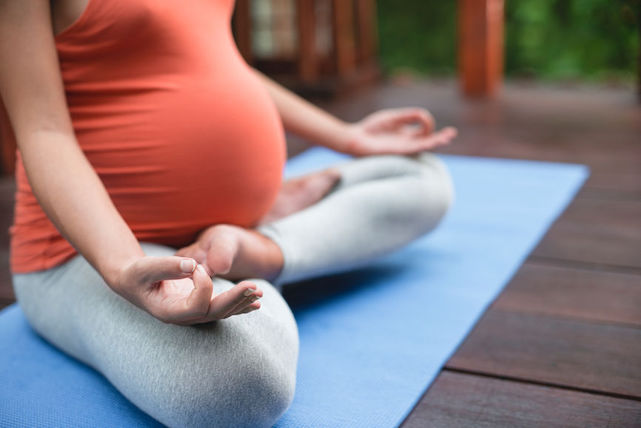
Welcome to my “Yoga Can…” Series! I’ll be writing a series of blog posts to expose you to all the benefits of yoga. There’s so much yoga can do to support a healthy lifestyle, particularly for working moms. This week we’ll talk about fertility. You may not realize how the stress of being a working mom can affect your fertility, especially if you aren’t trying to get pregnant again. When you are a busy working mom, you likely have stress hormones, adrenaline, and cortisol running rampant in your body more often than not. You have a to-do list that never gets done, and maybe life feels a little chaotic…
You are often overwhelmed and never feel like there are enough hours in the day.
Sound about right? Does that sound like an environment that would encourage a baby to nest with you? Hmmm, I don’t think so….
Infertility affects 7% of married women across the United States. Almost 2% of all infants born in this country were conceived with some sort of assisted reproductive technology, like in vitro fertilization or IVF. IVF however, has been known to produce a negative impact on a woman’s psychosocial health due to the emotional, physical and financial burden it can sometimes produce.
A staggering 50% of pregnancies end in miscarriage before a woman even knows she’s pregnant.
And 15-25% of all known pregnancies end in miscarriage. Miscarriages are the loss of pregnancy in the first 20 weeks, and anything after 20 weeks is known as late miscarriage. 80% of miscarriages happen in the first 3 months of pregnancy.
After my first pregnancy loss, I was extremely frustrated. It was late in my second trimester, so past the 20-week mark, and I was resentful and questioned if I and my provider did everything they could for my girls (yes I had twin girls, no IVF needed…).
I kept thinking I did everything right, so how could this have happened to me?
And then 2 years later, it happened again…Now completely at a loss, with no real explanation from modern medicine, I figured I would try a different approach. I read all I could about alternative ways to support pregnancy and assembled my team of experts in Chinese Medicine. I worked with two different acupuncturists, one local and the other virtually, both specializing in women’s health, started my “pre-mester” and rekindled my relationship with yoga. I had been doing yoga for years, but not consistently and mixed in with running, Crossfit, and Pilates. I stopped drinking coffee (and I loved coffee) and adhered to a vegan diet. I went to great lengths to preserve my fertility and create an environment that supported pregnancy and yoga was a critical piece to the puzzle.
How does yoga improve fertility?
The loss of a pregnancy, multiple pregnancies or difficulty getting pregnant can create significant anxiety and depression among women, reducing their quality of life. The use of yoga to support women through pregnancy loss nearly doubled between 2002 and 2012. The most notable effects are seen when yoga is used with acupuncture and IVF for ovarian hyperstimulation. In a recent study, researchers examined 11 studies where hatha yoga coupled with the use of complementary therapies and IVF increased fertility and improved quality of life. Researchers commenting on the importance of using mind-body practices to complement the burdens of IVF.
Yoga is associated with deep relaxation that reduces anxiety, depression and in particular cortisol levels. And it’s all about cortisol…
Cortisol is your body’s main stress hormone.
It’s important to understand cortisol because when controlled it can do amazing things for your health, but when uncontrolled, it is literally the worst thing for your health. Using yoga, you can regulate your cortisol to an optimal level. At optimum amounts, cortisol acts an anti-inflammatory hormone reducing stiffness and pain in the body. Cortisol can also lessen the impact of insulin helping you to burn fat instead of store it. And cortisol regulates your sleep-wake cycle giving you energy throughout the day.
When cortisol is uncontrolled the opposite it true; pain, stiffness, weight gain, and poor sleep.
If you aren’t trying to get pregnant, that doesn’t mean you’re in the clear. Cortisol affects your weight, your menstrual cycle, your memory, the way you feel, how you sleep, and how you treat others. And that’s the short list…
Yoga is a daily habit that you can do at a local studio (my favorite), a gym, or even at home. Even a rigorous practice can produce relaxation, reduce anxiety or depression and lower cortisol levels. I invite you to start a daily practice and see what yoga can do for you!
Stay tuned for more next week on my “Yoga Can” Series!
Talk soon,

Discover more from Dr. Cori Cooper
Subscribe to get the latest posts sent to your email.
+ show Comments
(review Comment Policy)
- Hide Comments
add a comment